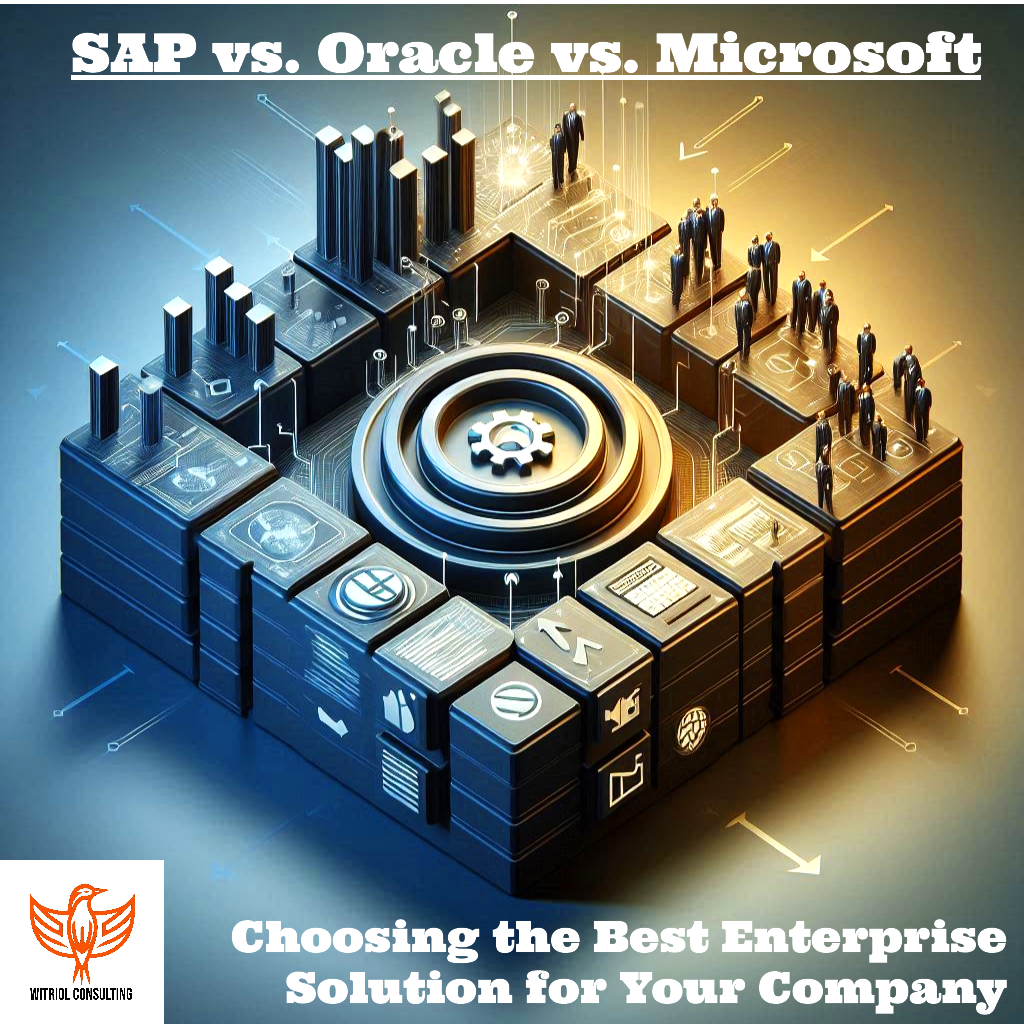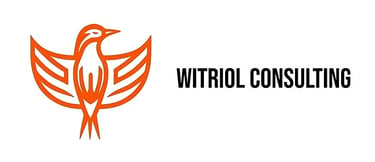SAP vs. Oracle vs. Microsoft: Choosing the Best Enterprise Solution for Your Company
In the realm of enterprise software, SAP, Oracle, and Microsoft are titans that offer comprehensive solutions to help organizations streamline their operations, enhance productivity, and drive growth. Each of these giants brings its own set of strengths, features, and considerations. For companies looking to invest in an enterprise resource planning (ERP) system or related enterprise applications, understanding the major differences between these platforms is crucial. This guide will delve into the key aspects of SAP, Oracle, and Microsoft, helping you make an informed decision about which is best suited for your company.
DATA DRIVENORGANIZATIONMANAGEMENT CONSULTINGCONSULTINGERPSTRATEGYFINANCECLOUDSUCCESSTECHNOLOGYCREATING VALUESAPORACLEMICROSOFTAI
Shaun Witriol
8/23/20245 min read


SAP vs. Oracle vs. Microsoft: Choosing the Best Enterprise Solution for Your Company
In the realm of enterprise software, SAP, Oracle, and Microsoft are titans that offer comprehensive solutions to help organizations streamline their operations, enhance productivity, and drive growth. Each of these giants brings its own set of strengths, features, and considerations. For companies looking to invest in an enterprise resource planning (ERP) system or related enterprise applications, understanding the major differences between these platforms is crucial. This guide will delve into the key aspects of SAP, Oracle, and Microsoft, helping you make an informed decision about which is best suited for your company.
1. Overview of SAP, Oracle, and Microsoft
SAP: Founded in 1972, SAP is renowned for its ERP systems and extensive suite of enterprise applications. The company's solutions are designed to support complex business processes across various industries, including finance, manufacturing, supply chain, and human resources.
Oracle: Established in 1977, Oracle is a major player in the database management system (DBMS) market and offers a broad range of enterprise software, including ERP, customer relationship management (CRM), and cloud solutions. Oracle's platforms are known for their robust database capabilities and integrated business applications.
Microsoft: Microsoft, founded in 1975, has expanded from its roots in operating systems and office productivity software to provide comprehensive enterprise solutions through Microsoft Dynamics 365. This suite integrates CRM and ERP functionalities, offering a unified approach to managing business processes.
2. Key Features and Capabilities
SAP:
Comprehensive ERP Solutions: SAP is renowned for its ERP suite, which includes modules for finance, logistics, human resources, and more. The integration between these modules allows for seamless data flow and process management.
Industry-Specific Solutions: SAP offers tailored solutions for various industries, including manufacturing, healthcare, and retail, providing industry-specific functionalities and compliance.
Strong Analytics and Reporting: With SAP HANA, the company offers powerful real-time analytics and reporting capabilities, enabling businesses to make data-driven decisions.
Oracle:
Integrated Cloud Applications: Oracle’s Cloud Applications suite provides a broad range of services, including ERP, HCM (Human Capital Management), and CRM. Its cloud solutions are designed to deliver flexibility and scalability.
Advanced Database Technology: Oracle is a leader in database management, offering advanced features like high availability, data security, and performance optimization.
Robust Business Intelligence: Oracle Analytics Cloud provides comprehensive business intelligence tools, including data visualization, reporting, and predictive analytics.
Microsoft:
Unified Ecosystem: Microsoft Dynamics 365 integrates ERP and CRM functionalities, offering a seamless user experience across various business functions. This integration enhances productivity and simplifies data management.
Cloud-First Approach: Microsoft’s cloud offerings are deeply integrated with Azure, providing a scalable and secure cloud infrastructure.
User-Friendly Interface: Dynamics 365 features an intuitive interface that leverages familiar Microsoft tools, making it easier for users to adapt and navigate.
3. Deployment Options
SAP:
On-Premise and Cloud: SAP offers both on-premise and cloud deployment options. SAP S/4HANA is available on-premise, in the cloud, and in a hybrid model, allowing businesses to choose the deployment that best suits their needs.
Flexibility: The cloud version, SAP S/4HANA Cloud, provides a more flexible and scalable solution with regular updates and reduced IT overhead.
Oracle:
Cloud-First: Oracle’s primary focus is on cloud-based solutions, with its Oracle Cloud Applications offering a comprehensive suite of ERP, HCM, and CRM solutions.
Hybrid Options: Oracle also supports hybrid deployments, allowing organizations to integrate cloud solutions with on-premise systems as needed.
Microsoft:
Cloud and On-Premise: Microsoft Dynamics 365 is available in the cloud and on-premise, providing flexibility to organizations with varying IT infrastructures.
Seamless Integration: The cloud version integrates seamlessly with other Microsoft products like Office 365 and Azure, enhancing overall productivity and data management.
4. Customization and Integration
SAP:
Extensive Customization: SAP offers a high degree of customization through its development tools and ecosystem. However, this can sometimes lead to complexity and higher implementation costs.
Integration Capabilities: SAP integrates well with other SAP products and third-party applications through its APIs and middleware.
Oracle:
Flexibility: Oracle applications are highly customizable, with a range of tools available for tailoring the system to specific business needs. Customizations can be complex and require specialized expertise.
Integration: Oracle provides robust integration capabilities, particularly with its own suite of products, and supports third-party integrations through APIs.
Microsoft:
Ease of Customization: Microsoft Dynamics 365 offers a user-friendly interface for customization and configuration, allowing businesses to tailor the system with minimal coding.
Integration with Microsoft Products: Dynamics 365 integrates seamlessly with other Microsoft products, such as Azure and Office 365, facilitating a unified user experience.
5. Cost and Licensing
SAP:
High Costs: SAP solutions tend to be on the higher end of the cost spectrum, with significant upfront investment and ongoing maintenance fees. Implementation costs can also be substantial, depending on the complexity and scale of the deployment.
Licensing Models: SAP offers various licensing models, including subscription-based and perpetual licenses, allowing organizations to choose based on their financial and operational needs.
Oracle:
Competitive Pricing: Oracle’s cloud-based solutions often offer competitive pricing with flexible subscription models. On-premise solutions may involve higher initial costs but provide long-term value.
Licensing Options: Oracle offers various licensing options, including subscription-based models for cloud services and perpetual licenses for on-premise deployments.
Microsoft:
Cost-Effective: Microsoft Dynamics 365 is generally considered cost-effective, especially for organizations already using Microsoft products. The cloud-based subscription model offers predictable costs and scalability.
Licensing Models: Microsoft provides a range of licensing options, including per-user and subscription-based models, catering to different organizational needs and budgets.
6. Support and Community
SAP:
Strong Support: SAP provides comprehensive support through its global network of consultants, support services, and a vast partner ecosystem.
Active Community: The SAP community is active and extensive, offering resources, forums, and user groups for collaboration and knowledge sharing.
Oracle:
Reliable Support: Oracle offers robust support services, including technical support, consulting, and a comprehensive knowledge base.
Engaged Community: Oracle has a strong community of users, developers, and partners that contribute to a wealth of resources and best practices.
Microsoft:
Excellent Support: Microsoft provides excellent support through its global network, including dedicated support teams and extensive online resources.
Large User Base: The Microsoft community is extensive, with numerous user groups, forums, and resources available for assistance and networking.
7. Making the Choice
When choosing between SAP, Oracle, and Microsoft, consider the following factors:
Business Requirements: Evaluate the specific needs of your business, including industry-specific requirements, scalability, and integration needs. Choose a solution that aligns with your operational goals and industry standards.
Budget: Assess the total cost of ownership, including implementation, licensing, and ongoing maintenance costs. Consider the long-term value and return on investment for each option.
Deployment Preferences: Decide on your preferred deployment model—cloud, on-premise, or hybrid. Ensure the solution you choose aligns with your IT infrastructure and strategic goals.
Customization and Integration: Consider how much customization you need and how easily the solution integrates with your existing systems and processes.
Support and Community: Evaluate the level of support provided by each vendor and the strength of their user community. Access to resources and expertise can significantly impact the success of your implementation.
Conclusion
Choosing the right enterprise solution is a critical decision that can influence your company’s efficiency, scalability, and overall success. SAP, Oracle, and Microsoft each offer robust and unique features tailored to different business needs. By carefully evaluating your requirements, budget, deployment preferences, and support needs, you can make an informed choice that will drive your business forward.
Current Certifications
Small Local Business Enterprise (SLBE) - (San Diego)
Local Small Business Enterprise - (LSBE) - (Los Angeles)
Minority Owned Business (MBE) - (San Diego and Los Angeles, Federal)
Small Business (Micro) - (California)
Disadvantaged Business Enterprise - (California, Arizona, Oregon, Hawaii)
Small Disadvantaged Business - (Federal)
Asian Pacific Business Enterprise - (Federal)
Pending Certifications
8a - (Federal)
© 2024. All rights reserved.


certifications
consultations
